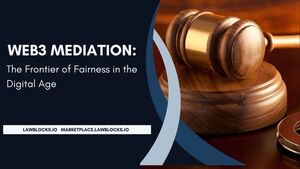-
 Retrouver dansMembres
Retrouver dansMembres Retrouver dansVidéos
Retrouver dansVidéos Retrouver dansChaînes
Retrouver dansChaînes
This website uses cookies to ensure you get the best experience on our website.
To learn more about our privacy policy Cliquez iciPréférence de confidentialité
- Mots clés - #Web3 Mediation
-
- Dernière mise à jour 1 avril 2024 0 commentaire , 107 vues, 0 comme
More from Olivia kelly
More in Politics
Related Blogs
Les archives
Web3 Mediation: The Frontier of Fairness in the Digital Age
Corps
elcome to the cutting-edge intersection of technology and conflict resolution: Web3-based mediation. As our world becomes increasingly digitized, the mechanisms we use to resolve disputes must evolve accordingly. This blog post will take you on a journey through the innovative world of Web3 mediation, where blockchain technology is leveraged to create a more equitable and efficient process for all parties involved.
The Evolution of Mediation
Mediation has long been a preferred method for resolving disputes due to its collaborative and non-adversarial nature. However, traditional mediation faces challenges such as geographical limitations, time constraints, and accessibility. Web3 mediation transcends these barriers, offering a global platform that is accessible 24/7.
The Mechanics of Web3 Mediation
Web3 mediation operates on the principles of blockchain technology, ensuring transparency, security, and immutability. Smart contracts play a crucial role, automating the enforcement of agreements and streamlining the resolution process. This not only saves time but also reduces the potential for human error or bias.
The Advantages of Web3 Mediation
-
Global Reach: Parties from different corners of the world can resolve disputes without ever leaving their homes.
-
Anonymity: Participants can maintain their privacy, a feature particularly beneficial for sensitive matters.
-
Cost-Effectiveness: By cutting out intermediaries, Web3 mediation reduces costs associated with dispute resolution.
-
Speed: The use of smart contracts accelerates the mediation process, allowing for quicker resolutions.
-
Innovation: Web3 mediation introduces novel approaches to conflict resolution, including the potential for AI-assisted mediation.
The Future of Dispute Resolution
As we look to the future, it's clear that Web3 mediation has the potential to revolutionize the way we handle disputes. With ongoing advancements in blockchain technology and a growing emphasis on digital solutions, Web3 mediation is poised to become a standard practice in the field of dispute resolution.
Conclusion
Web3 based mediation represents a significant step forward in our quest for a more just and efficient dispute resolution system. It embodies the principles of fairness, accessibility, and innovation, making it an exciting development for mediators, disputants, and legal professionals alike. As we embrace this new era of digital justice, we open the door to a world where resolution is not just possible—it's streamlined, secure, and equitable.












commentaires